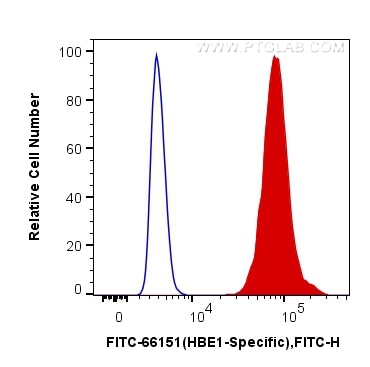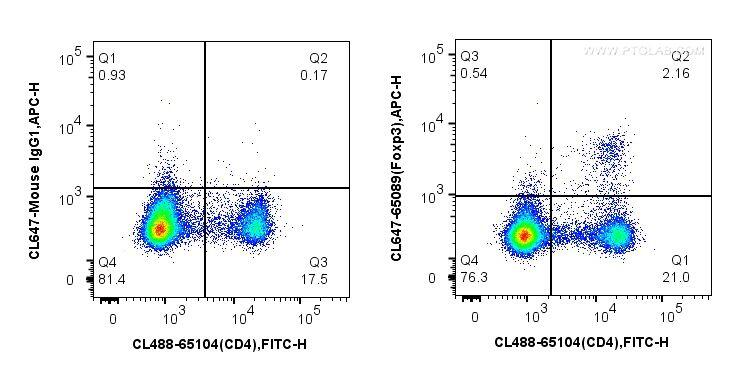HBE1-Specific Monoklonaler Antikörper
HBE1-Specific Monoklonal Antikörper für FC (Intra)
Wirt / Isotyp
Maus / IgG1
Getestete Reaktivität
human
Anwendung
FC (Intra)
Konjugation
FITC Fluorescent Dye
CloneNo.
2C11G6
Kat-Nr. : FITC-66151
Synonyme
Galerie der Validierungsdaten
Geprüfte Anwendungen
| Erfolgreiche Detektion in FC | K-562-Zellen |
Empfohlene Verdünnung
| Anwendung | Verdünnung |
|---|---|
| Sample-dependent, check data in validation data gallery | |
Produktinformation
FITC-66151 bindet in FC (Intra) HBE1-Specific und zeigt Reaktivität mit human
| Getestete Reaktivität | human |
| Wirt / Isotyp | Maus / IgG1 |
| Klonalität | Monoklonal |
| Typ | Antikörper |
| Immunogen | Fusionsprotein |
| Vollständiger Name | hemoglobin, epsilon 1 |
| Beobachtetes Molekulargewicht | 16 kDa |
| GenBank-Zugangsnummer | NM_005330 |
| Gene symbol | HBE1 |
| Gene ID (NCBI) | 3046 |
| Konjugation | FITC Fluorescent Dye |
| Excitation/Emission maxima wavelengths | 494 nm / 520 nm |
| Form | Liquid |
| Reinigungsmethode | Protein-G-Reinigung |
| Lagerungspuffer | BS mit 50% Glyzerin, 0,05% Proclin300, 0,5% BSA, pH 7,3. |
| Lagerungsbedingungen | Bei -20°C lagern. Vor Licht schützen. Nach dem Versand ein Jahr stabil. Aliquotieren ist bei -20oC Lagerung nicht notwendig. 20ul Größen enthalten 0,1% BSA. |
Hintergrundinformationen
The hemoglobin molecule is a tetramer consisting of two α-globin-like polypeptide chains and two β-globin-like chains. The human hemoglobin genes are expressed in a tightly developmentally controlled fashion.ε-globin (HBE1) is the predominantly expressed gene during the embryonic stage. The epsilon hemoglobin chain seems to be the best marker for fetal nucleated red blood cells (NRBCs). Anti-HBE1 may be used to label and isolate fetal cells from maternal blood and can be useful in prenatal diagnosis. This antibody specifically recognizes the HBE1 and doesn't cross-react with other globin chains. This antibody is conjugated with FITC.
Protokolle
| Produktspezifische Protokolle | |
|---|---|
| FC protocol for FITC HBE1-Specific antibody FITC-66151 | Protokoll herunterladen |
| Standard-Protokolle | |
|---|---|
| Klicken Sie hier, um unsere Standardprotokolle anzuzeigen |



